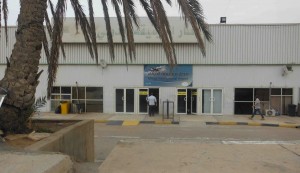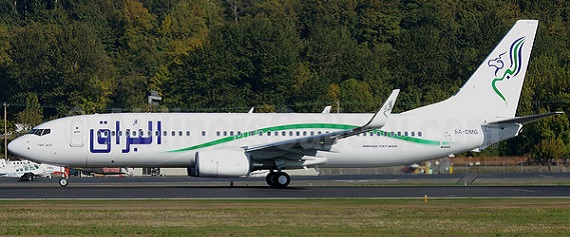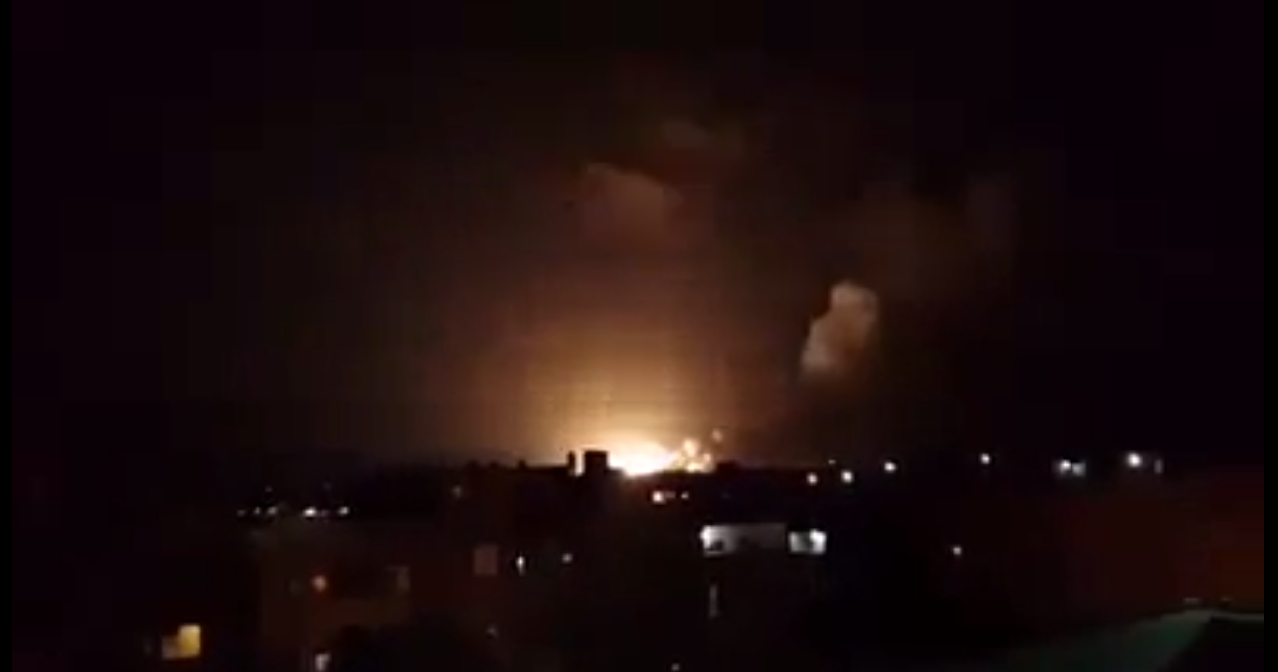Libya Herald .....

Snopes on the alleged missing libyan jets .....

Claim: Eleven passenger planes are missing from an airport in Libya.


Example: [Collected via email, September 2014]
Origins: In early August 2014, some North African bloggers began to spread stories that several commercial airliners went missing from the Tripoli International Airport during or shortly after the facility was taken over by Zintan militia forces earlier in the summer. Later that month translations of the blog posts began to be picked up by news outlets in Western Europe and passed on as fact rather than gossip; by early September those tales from translations of blogs had spread to the United States under the guise of real news.
The use of airplanes as terrorist weapons in 2001 makes it all too easy for us to anticipate their being used that way again. And despite denials from all sides — the airlines who are not missing any planes, the Libyan transport ministry, and the anti-government forces in control of the airport — the tales have found a ready audience among a populace already on edge in anticipation of the anniversary of the 9/11 attacks.
However, there have been no statements from the State Department, the Department of Defense, Homeland Security, or any other authority warning of stolen airliners. The national threat level has not been raised. Algerian and Moroccan military and air defense, already on high alert due to the unrest in nearby Libya, would undoubtedly have noticed multiple flights of unidentified passenger aircraft.
As a thread on the aviation community site airliners.net documents, several of the planes claimed in rumors as "missing" or "stolen" have actually been accounted for, having been either caught outside of Tripoli at the time the airport fell to opposition forces or relocated by their operators (Air Contractors pf Dublin) to an airport in Malta for safekeeping. Some of the other airliners were likely destroyed in the fighting or damaged beyond the possibility of operation.
Libya Dawn rejects ceasefire attempts
By Libya Herald staff.
Tripoli, 5 September 2014:
A delegation from the House of Representatives has failed in repeated bids to broker a ceasefire between militias fighting in and around Tripoli.
It is being claimed that there have been no less than 26 separate attempts to talk to Libyan Dawn representatives, all of which have been rebuffed.
The group was made up of 13 representatives from the HoR Ceasefire Committee set up on 17 August. House member Sallah Al-Sahbi told the Arabic language newspaper Buwabat Al-Wasat, they had been trying to negotiate the ceasefire and convince Libya Dawn militias to quit the capital.
Sahbi added that they are working together with the preparatory group for the Libyan National Dialogue initiative and some five other groups, including the United Nations, tribal representatives and Libyan city and regional leaders
The very first resolution passed by HoR from Tobruk was the order for a ceasefire on 7 August.
Strike shuts Mitiga after attack on staff
By Libya Herald reporters.

Mitiga Airport’s main entrance (Photo: Nigel Ash, Libya Herald)
Tripoli, 5 September 2014:
Striking workers shut down Tripoli’s Mitiga Airport for some hours today after check-in staff were reportedly beaten up for refusing to board a passenger.
A source at the airport told the Libya Herald that the fracas broke out when someone seeking to join a flight to Istanbul was refused a boarding pass. Armed militiamen, who were seemingly friends of the frustrated traveller, then attacked at least one of the airport staff. As a result other employees at Mitiga went on strike and stopped all outbound flights.
This evening, Mohamed Gnewa, a spokesman for the Libyan Civil Aviation Authority told this newspaper that the strike had been settled and airport staff had returned to their posts. Flights were now running in and out of Mitiga.
The incident will however have undermined attempts to have Mitiga accepted, particularly by European aviation authorities, as a safe and viable alternative to the wrecked and burnt-out Tripoli International on the other side of the capital. There are so far unconfirmed reports that a deal with a Turkish company is in the offing for the construction of a new terminal at Mitiga in only 60 days.
Ambassador in Cairo dismisses GNC shut-down order
By Libya Herald reporters.
Cairo, 5 September 2014:
Libya’s ambassador to Egypt Mohamed Fayez Abdul-Aziz Jibril has refused an order from the GNC in Tripoli to close down the Cairo embassy and said he is only responsible to the House of Representatives.
Nuri Abu Sahmain, who as president of the resurrected GNC claims that he is still Libya’s head of state, ordered the closure of Libyan embassies in Egypt and the UAE accusing both countries of being responsible for last month’s aerial attacks on Libya Dawn militias in Tripoli.
Jibril told the Libya Herald “We no longer listen to Abu Sahmain or the GNC. They no longer have any authority. Their time is expired. They had their time (18 months) to govern and look where it got us—crisis”.
Jibril added that the GNC had helped make the road map for the election of the HoR but had since refused to recognise the new parliament.
“We answer only to the HoR. We do not even pay any attention to this supposed order by Abu Sahmain. In fact, we are not sure if it even officially came from him or was just made up by rumours on the internet. No official notification came to us. But even if it did, it would not matter because we don’t listen to the GNC or him anymore.”
CBL denies delay in payment of HoR salaries
By Libya Herald reporters.
Tripoli, 5 September 2014:
The Central Bank of Libya (CBL) has flatly denied that it has withheld salaries from members of the House of Representatives (HoR . . .
Missile attacks west of Tripoli block route to Tunisia
By Ajnadin Mustafa.
Tripoli, 4 September 2014:
Roads from Tripoli heading west to the Tunisian border were effectively closed yesterday and today as Libya Shield West forces and their allies in Operation Libya Dawn bombarded positions in the Washefana area ahead of an anticipated push by Zintani forces back into the capital.
The Zintanis have said they intend to return to Tripoli because, they allege, the Misratans reneged on a deal under which both would withdraw from Tripoli.
The main coastal road next to the site of Camp 27, which was heavily fought over last month between Warshefana and Libya Dawn forces, had already been dug up by the former, forcing travellers to make major detours. The detours depend on the identity of the travellers. Residents of Zawia have been forced to make a massive 100-kilometre detour around the Warshfana area when heading to Tripoli although they (but not their military leaders) were reported to be allowed to drive through Azziziya, a Washefana stronghold.
However, that road yesterday is now reported to be too dangerous to travel on.
There has been an irregular barrage of missiles said to be from the Janzour Fursan Brigade and Libya Shield West hitting the Warshefana area over the past two days. Early yesterday morning, four people – a father and his sons plus a neighbour were reported killed when a missile hit Enjila, south of Janzour. His wife and other children were seriously injured.
Missiles continued to land today in west Janzour as well as in Zahra, Maamoura and other the Washefana towns. There are reports injuries and deaths but no official figures. Warshefana families have been trying to leave for safety but say they have no where to go – that they dare not head to Zawia or Tripoli because they will be arrested.
Heavy clashes were also reported at the Camp 27 site today between forces from Zawia, the Janzour Forsan and Libya Shield West on one side and, on the other, the newly launched “tribal army” said to consist of forces from the Warshefana, Zintan, Tarhouna and Rijban, among others.
Near Gharian, too, there was said to be fighting between forces from Gharian and Zintan.
Massive explosions in Benghazi as weapons depot destroyed
By Noora Ibrahim.
Benghazi, 4 September 2014:
A massive explosion in the Benghazi district of Buatni lit the night sky last night as Operation Dignity bombed Islamist positions across the city, including one large weapons store.
The Commander of Operation Dignity’s Air Force, Adam Saqr Geroushi, told the Libya Herald that his aircraft had carried out attacks on nine separate locations across the city including Gunfudah on the outskirts and 319 Camp in Buatni which is where the giant explosion took place.
The attacks appear to have been carried out with remarkable accuracy.
Geroushi explained that Dignity warplanes had carried out stikes on 319 Camp in Buatni, formerly the Saiqa Special Forces base, but captured by Ansar Al-Sharia and its allies last month and used for storing munitions.
Buatni has been the site of some of the worst violence in Benghazi over the last month and a half after Ansar Al-Sharia was able to drive Saiqa Special Forces from its base in the district. Most residents from the area have now been displaced and are sheltering in schools or with friends and relatives in other parts of the city.
Benina Airport and a nearby Air Defence base are the last major positions held by Operation Dignity in Benghazi with Ansar Al-Sharia making ever bolder attacks on airport on a daily basis.
Tweets of the day....
BREAKING: The Libyan National Army amasses on the outskirts of Tripoli, sources tell Al Arabiya. #Libya
Libya’s ambassador to Egypt has refused an order from the GNC in Tripoli to close down the Cairo embassy
http://mebriefing.com/?p=1005
Why Is Washington So Angry with UAE and Egypt Over Libya Bombing?
Last week’s air strikes against Islamist militias of the Libya Dawn alliance in Tripoli have been harshly denounced by the United States government, which has officially blamed Egypt and the United Arab Emirates (UAE) for the attacks. Despite Egyptian and UAE denials, at an August 26 Pentagon briefing, Rear Admiral John Kirby confirmed that the U.S. believes that UAE fighter planes, based in Egypt, had carried out the bombing raids, which had failed to block Libya Dawn forces from taking over the Tripoli International Airport and most of the capital. He added that the U.S. policy is that Libya’s ongoing crisis must be settled “peacefully, and through good governance and politics and not violence, and that we discourage other nations from taking a part in Libya’s issues through violence.”
Despite repeated denials from both the UAE and Egypt and a total lack of any proof, State Department spokesperson Jan Psaki delivered a similar message the same day, telling reporters that “We understand that there were airstrikes undertaken in recent days by the UAE and Egypt,” adding that “We believe outside interference in Libya exacerbates current divisions and undermines Libya’s democratic transition.”
With two rival governments in place in Tripoli and Tobruk, backed by rival armed forces, Libya is hardly in a “democratic transition.” And following the 2011 British, French, American-led military intervention in Libya to oust and eventually get rid of Muammar Qadaffi, it can hardly be said that the Obama Administration is categorically opposed to outside intervention or use of arms.
According to MEB information, the real reason for the Obama Administration’s anger and frustration with Egypt and the UAE is that Washington has been quietly attempting to build support from the European Union, Russia and China to establish a United Nations-mandated peacekeeping force to move in and stabilize Libya, support the recently elected non-Islamist parliament (now residing in Tobruk), and disarm the Islamist militias—before they formally ally with the Islamic State (IS). Egypt and Algeria were seen by Washington as the ideal candidates to lead the UN-mandated force.
From Washington’s standpoint, the bombing missions all-but wrecked the quiet plans. The bombing raids targeted the Libya Dawn forces and also hit a number of training camps in eastern Libya where the Muslim Brotherhood was building its militia forces, according to sources. To Washington, the meaning of the bombings, which were not discussed in advance with the Obama Administration, but were clearly detected by U.S. satellites, is a signal that Egypt is still engaged in a military campaign to wipe out the Muslim Brotherhood, and that this takes precedence over the larger American plan to bring some degree of stability to Libya. It also means that Egypt is more closely aligned with regional allies, including the UAE, Saudi Arabia and Kuwait than with Washington.
Indeed, on August 24, the foreign ministers of Egypt, Saudi Arabia, UAE, Jordan and Qatar met in Jeddah to discuss the growing threat posed by IS to the entire region. Among the topics on the table: the formation of a NATO-type structure for regional security, with Egypt, Saudi Arabia, the UAE and Algeria forging a military and intelligence-sharing arrangement.
Despite repeated denials from both the UAE and Egypt and a total lack of any proof, State Department spokesperson Jan Psaki delivered a similar message the same day, telling reporters that “We understand that there were airstrikes undertaken in recent days by the UAE and Egypt,” adding that “We believe outside interference in Libya exacerbates current divisions and undermines Libya’s democratic transition.”
With two rival governments in place in Tripoli and Tobruk, backed by rival armed forces, Libya is hardly in a “democratic transition.” And following the 2011 British, French, American-led military intervention in Libya to oust and eventually get rid of Muammar Qadaffi, it can hardly be said that the Obama Administration is categorically opposed to outside intervention or use of arms.
According to MEB information, the real reason for the Obama Administration’s anger and frustration with Egypt and the UAE is that Washington has been quietly attempting to build support from the European Union, Russia and China to establish a United Nations-mandated peacekeeping force to move in and stabilize Libya, support the recently elected non-Islamist parliament (now residing in Tobruk), and disarm the Islamist militias—before they formally ally with the Islamic State (IS). Egypt and Algeria were seen by Washington as the ideal candidates to lead the UN-mandated force.
From Washington’s standpoint, the bombing missions all-but wrecked the quiet plans. The bombing raids targeted the Libya Dawn forces and also hit a number of training camps in eastern Libya where the Muslim Brotherhood was building its militia forces, according to sources. To Washington, the meaning of the bombings, which were not discussed in advance with the Obama Administration, but were clearly detected by U.S. satellites, is a signal that Egypt is still engaged in a military campaign to wipe out the Muslim Brotherhood, and that this takes precedence over the larger American plan to bring some degree of stability to Libya. It also means that Egypt is more closely aligned with regional allies, including the UAE, Saudi Arabia and Kuwait than with Washington.
Indeed, on August 24, the foreign ministers of Egypt, Saudi Arabia, UAE, Jordan and Qatar met in Jeddah to discuss the growing threat posed by IS to the entire region. Among the topics on the table: the formation of a NATO-type structure for regional security, with Egypt, Saudi Arabia, the UAE and Algeria forging a military and intelligence-sharing arrangement.
A lengthy report in the August 28 issue of Al Ahram Weekly shed further light on the emerging Egyptian thinking. The author, Reem Leila, wrote that Egypt, under President al-Sissi, is now re-emerging as a regional peacemaker and power-broker. This was most recently demonstrated in Cairo’s role in brokering the ceasefire between Israel and the Palestinians, after mediating a unity agreement between Fatah and Hamas.
Snopes on the alleged missing libyan jets .....
Missing Planes

Claim: Eleven passenger planes are missing from an airport in Libya.


Example: [Collected via email, September 2014]
Seeking truth in stir of 11 missing / stolen commercial airliners from the Libyan airport during the fall of Tripoli.
Origins: In early August 2014, some North African bloggers began to spread stories that several commercial airliners went missing from the Tripoli International Airport during or shortly after the facility was taken over by Zintan militia forces earlier in the summer. Later that month translations of the blog posts began to be picked up by news outlets in Western Europe and passed on as fact rather than gossip; by early September those tales from translations of blogs had spread to the United States under the guise of real news.
The use of airplanes as terrorist weapons in 2001 makes it all too easy for us to anticipate their being used that way again. And despite denials from all sides — the airlines who are not missing any planes, the Libyan transport ministry, and the anti-government forces in control of the airport — the tales have found a ready audience among a populace already on edge in anticipation of the anniversary of the 9/11 attacks.
However, there have been no statements from the State Department, the Department of Defense, Homeland Security, or any other authority warning of stolen airliners. The national threat level has not been raised. Algerian and Moroccan military and air defense, already on high alert due to the unrest in nearby Libya, would undoubtedly have noticed multiple flights of unidentified passenger aircraft.
As a thread on the aviation community site airliners.net documents, several of the planes claimed in rumors as "missing" or "stolen" have actually been accounted for, having been either caught outside of Tripoli at the time the airport fell to opposition forces or relocated by their operators (Air Contractors pf Dublin) to an airport in Malta for safekeeping. Some of the other airliners were likely destroyed in the fighting or damaged beyond the possibility of operation.

 Al Arabiya English
Al Arabiya English  Libyan™
Libyan™
No comments:
Post a Comment